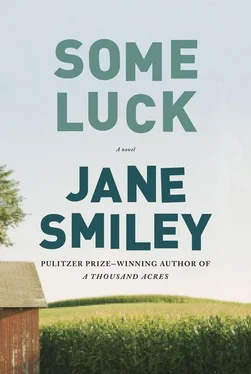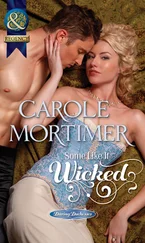“Your family, maybe, but even Opa only needed reading glasses after he was sixty-five.”
Claire wasn’t quite sure what she was supposed to do at the optometrist’s. There were things that she looked through and things that she looked at — mostly letters and figures, some of them filled in and some of them empty. The optometrist kept asking her questions, and after a while she was so bored that she just said anything that came into her head, or she tried looking at the things with one eye closed or squinting or something, which changed the way they looked. But she behaved herself. She always behaved herself. She did not fidget, and she spoke only when spoken to, and she kept her fingernails out of her mouth and also her hair. At school sometimes, she found the end of her left pigtail in her mouth, but only when the teacher was so boring that she made Claire forget what she was doing and where she was. Finally, while the optometrist was adjusting yet another machine, Claire put her head down on the table and dozed off. When she woke up, Mama was right there. She said, “What in the world is going on?”
“Well, she needs glasses, but I can’t figure out …”
“Claire, are you giving Dr. Hicks a hard time?”
Claire shook her head.
She did, however, get glasses. Dr. Hicks had lots of styles. Claire sat in front of a mirror, and Dr. Hicks hooked them over her ears one temple at a time. He said, “Well, she has a round face, and so …”
“I don’t think of her face as round. More heart-shaped,” said Mama.
“Well, you see, though, this rounder frame is a bit more flattering. For the heart-shaped face, we like a wider frame. Perhaps if she wore her hair down rather than in pigtails.”
Mama ignored this. “I think she looks fine in the rounder frame. But which is the sturdiest one? These are thirty dollars?”
“Yes, and that includes the frame, but for ten dollars more, I can give you a new type of lens that is really plastic. Much less easily broken.”
“I’m sure Claire will be very careful with them.”
In the end, they bought the new kind. Every morning, every afternoon after school, and every night before bed, Mama asked her where her glasses were if she was not wearing them. Claire got to be quite jumpy — when Mama used a certain tone, her hand would go straight to her face, not because she didn’t know whether or not she had them on, but because she didn’t know where they were. Didn’t she care about being able to see?
Yes, she did, and there actually was quite a difference, but the glasses were a big responsibility. It was easier to sit in the first row and lean toward the blackboard and squint than it was to keep track of the darn things. And then, every time she didn’t know where they were, it started an argument between Mama and Papa. Mama would say, “Is this child ever going to learn how to take care of her things?” and Papa would say, “She does fine. The problem is that you only have one to fuss over. Not enough chaos for you.”
“Henry still lives at home.”
“But if you fuss over Henry, he just walks away.”
“She’s eight years old. Eight-year-olds take a little fussing.”
Walter shrugged, patted Claire on her hair, on the head that sat on top of her round face. At night, in bed, after taking off her glasses, and putting them carefully, temples down, never lenses down, on the table beside her bed, she lay on her back and set her palms beside her cheekbones and pressed. She pressed as hard as she could, counting to a hundred, three times, and then she fell asleep, pulling her chin down. Glasses were bad enough, and a round face was pretty bad, too, but glasses and a round face were hopeless.
NOW THAT SCHOOL WAS out, Henry had decided to rearrange his books. The day was hot, so he opened both windows and the door into the main part of the house. He smoothed his bedspread, and then took the books down, author by author. Right now they were arranged alphabetically, but, obviously, the better way was chronologically. The real question, which he hadn’t yet answered in his own mind, was if they were chronological, should the chronology cross national boundaries or remain within a particular nation, and was a nation the same thing as a culture? Another detail concerned translations. At this point, Henry only read French and German. Granny Mary had given him some German books — the three Wallenstein plays by Friedrich Schiller, a well-read copy of Die Leiden des jungen Werthers and another of Faust , a book called Das Erdbeben in Chili , by Heinrich von Kleist that Henry had not been able to get through (nor had anyone else, it looked like). There was also a missal and a book of lieder. Of course, there were no German books to buy anywhere anymore, and Henry didn’t dare ask for them at the library. He had only two French books, Madame Bovary and Les Trois Mousquetaires , which his French teacher, Madame Hoch, had given him, both in Bibliothèque de la Pléiade editions. He was her favorite student. These books, the German and the French, he set against the end of the bookcase. Once he had done that, he decided to arrange the translations chronologically by author, and chronologically within authors.
The authors he had most of were Charles Dickens, Robert Louis Stevenson, and Wilkie Collins, but he also had a book of all of Shakespeare’s plays, which he had read from cover to cover in the winter, without, he was willing to admit, understanding much. They had read Twelfth Night and Much Ado About Nothing at school, and they were due to read Hamlet in eleventh grade. He liked Hamlet okay. He set the Shakespeare book on the shelf above Les Trois Mousquetaires . The plays he had liked were the one called Measure for Measure , and another one called Macbeth . They were easy to follow, and what happened in them was kind of like what happened in junior high school.
As he placed the books on the shelves, rather happy with his arrangement, he wondered what he should do with the books he had stolen from the library. The evidence that they were from the library was right there on the binding, and obviously he could not cut the binding, which would deface them — he had already tried, unsuccessfully, to remove the numbers by erasing them, and even dabbing them with a little alcohol, but to no effect. The stolen books were under his bed, and they were his favorites — that’s why they were stolen, and he didn’t think anyone at school missed them. If there was another high-school kid in Usherton, at least in North Usherton, who gave a damn about The History of Tom Jones, a Foundling , a translation from the French of Père Goriot , a translation from the Russian of Oblomov , and another of Dead Souls , and a version in the original (which Henry could not make head or tail of) of Beowulf , Henry could not figure out who that would be. These books he had found on his own, wandering around the stacks, and none of them had been checked out since before the war. They were dusty and stiff, and Henry felt that he had rescued them. Except for Beowulf , he had read them all straight through, staying up late every night (and until morning for Tom Jones ). They possessed him, and since he had stolen them rather than checking them out, those who did not miss them also did not know where they were. There was the remote possibility that Mama would find them, but Henry kept his own room neat, made his own bed every day, and gave Mama every appearance of total candor and no reason to pry.
Now he sat down on his bed and looked at the shelves. He liked the effect. Orderly, with books running left to right, like print. The shelves were not even or balanced, the way Mama would like them, and they had no doodads in place of books, something Mama also preferred. To the right, they had varying stretches of empty space, to be filled by more books, books that would be interleaved with the ones he already had. It was lovely, and gave him a wonderfully hopeful feeling about leaving the farm and seeing the world. Washington or San Francisco? The choice made him run his index finger back and forth over the scar under his lip. If he kept working as Dan Crest’s stock boy, which he had done now since Christmas, he could earn his ticket to one or the other, his choice, but he couldn’t for the life of him decide what his choice would be. Eloise was his favorite relative, wiry and funny and not so gapingly naïve as Lillian, but Washington was closer to France, England, and Germany. Once you got there, you might just step across. There was always that person, man or woman or fairy or monster, older or younger, or ageless, who would come up to you and ask you for a favor, or offer you a choice, and the reward would be your dearest wish. What was the name of that story Lillian had told him before he could read? “Lucky Hans.” It was a cross between “Little Red Riding Hood” and “Puss in Boots”—the boy sets out through the forest, and since he has forgotten his napkin full of food, he gets very hungry. Pretty soon, he sees a small cabin, and the door is open, so he goes inside, calling out, “Hello! Hello!” A voice from the inner room calls out, “Come help me, my child!” And the boy tiptoes into the inner room. In the bed is a giant wolf, his mouth full of fangs and dripping with slobber, and as he sees Hans, he licks his lips. But Hans says, “What can I do for you?” And the wolf says, “Feel my brow.” Hans is terrified that the wolf will bite his arm off, but he reaches out and strokes the wolf on the head. At that moment, the wolf gives a tremendous howl and leaps from the bed, and Hans thinks that he is going to be eaten, but instead the wolf changes into a prince, and the prince snaps his fingers, and the cabin becomes a castle, and Hans finds himself in a tower, looking out over the forest. It is a beautiful view, and all of it belongs to the prince, who asks Hans what he wants as his reward, and Hans asks for an old horse and a piece of gold, so he can see the world. The prince thinks this is a very small reward, but it is all Hans wants, so the prince makes sure that every time he spends the gold it is returned to him, and every time he saddles the old horse it grows younger. At the end of Hans’s life, after he has seen (and this was Lillian’s list) “China, Russia, Nashville, Chicago, the North Pole, Germany, London, and Florida,” he comes back to the castle and lives in his room and eats tapioca pudding every day. Well, thought Henry, it could happen. You just had to decide — San Francisco, or Washington.
Читать дальше












